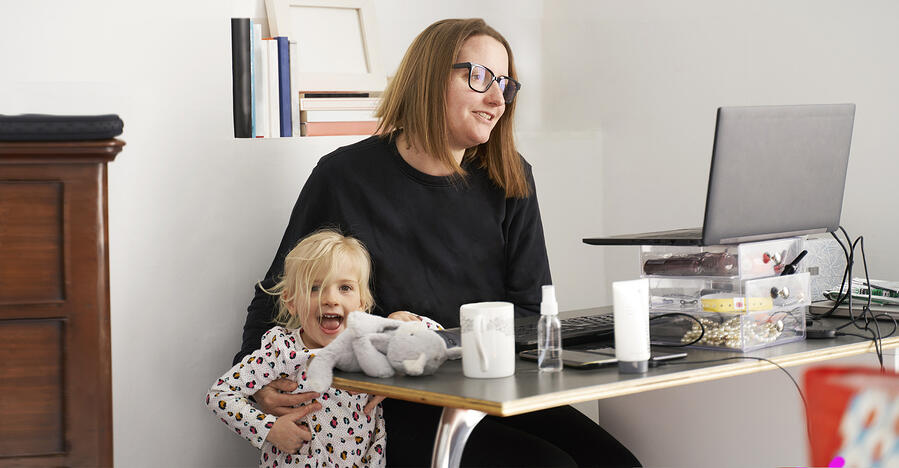
A look at how Covid-19 has made the "second shift" harder for working parents
Ameena is a married woman with two boys, ages 8 and 10, living in California. She’s a Type A personality and her high end job in the biotech industry reflects that. But the past 18 months of working from home while managing her children and household have pushed even this high-achiever to the breaking point. “The mental load is always there,” Ameena tells Avast. “Grocery shopping, dinners, dentist appointments, birthday cards — yes, all of that is still on me. My husband has been filling in during working hours. So at least, during my working hours, I can focus on work. But then I totally have to jump into that second shift.” The “second shift” Ameena is referring to is a term coined by sociologist Arlie Hochschild in 1989. It describes the “second shift” of work that parents — usually mothers — have to do when they finish their paying job. The second shift consists of things like picking up the kids from school, making sure dinner is on the table, taking care of laundry, etc. Basically, all of the things that a stay-at-home parent does — but done by a parent who also works outside the home. And while working a second shift can be hard enough under normal circumstances, parents who are able to work from home since the pandemic started have found that the collapse of the structures that kept their lives in order — offices, school, after school activities, to name a few — has led to things getting done, but getting done a lot worse. “I kind of feel like I’m failing at everything,” Sarah,* another mom of two who works in biotech, tells Avast. “I definitely had better balance going into the office. I think because when I was at work I could focus on work and when I was at home I could focus on home. It was easier to focus on one.” Both Ameena and Sarah recognize that, in so many ways, they’re lucky. They’ve been able to work through the pandemic, when so many others haven’t. Ameena’s husband is a software engineer with a flexible work schedule, so he’s able to parent during the day. And Sarah’s husband, also a software engineer, lost his job in the fall of 2020. “I never thought one of us being laid off would be a godsend,” Sarah says. “It would have been so scary, but we were in such a state trying to figure out what to do about childcare that it was a huge relief.” Yet even with husbands who are available to “help” parent, both women say that they’re still picking up a higher percentage of the housework and childcare. Since being laid off from his job in August, Sarah’s husband is on kid duty during the day so she can focus on work. But she still does “80 percent” of the cooking, and the balance of labor continues to be a struggle. “[My husband] hates going to the grocery but I’m like, ‘You’re home all day! You can do it!’” Sarah says. “Why should I have to go on a Saturday when it’s crowded when you can go on a Tuesday morning when no one is there?” But Sarah does see one silver lining in this situation: The pandemic has brought the imbalance of childcare and housework in her household into stark relief. Her husband is “doing more than he ever did,” although she’s skeptical that will continue when he gets a job again. “One thing he doesn’t get is the mental load,” she says. “I think he doesn’t really understand all of the things I’m doing, keeping straight. Who needs new shoes — who has a dentist appointment. All of these things that ‘just happen.’” Both women are also concerned about the effect of having Mom and Dad at home but not really “home.” For Ameena, the guilt about what this past year and a half has done to her kids is so heavy it makes her cry. “It’s just not fair to them,” she says. “There’s just a lot of guilt, because they do not have my attention. They’re just so confused that we’re home and we can’t give them what they need. When they do have my attention, I am not a happy person. I know I’m mean. I know I yell. And they see it. And I don’t recognize myself from a year ago.” While the prospect of their kids returning to school full time brings some measure of relief, both moms are also terrified, especially because their children aren’t old enough to be vaccinated. “I want them to go back to school,” Ameena says. “I think my younger son needs to go back to school, socially, but it’s terrifying because I don’t want them to get Covid." Further reading: The pandemic has taken the stressors of both working and managing a home and collapsed it into one big, indistinguishable, stressful miasma in which women feel they’re never, ever good enough. It’s not even a second shift anymore — it’s a 24/7, non-stop shift. And it’s brought many to the breaking point. “I was told I can have my amazing career and I can be that wife and mother and have a home,” Ameena says. “And I think that’s all BS. There’s no way you can have it all. I think that’s a lie. I remember telling my mother: you lied to me. This is not what it’s cracked up to be. You can’t have it all. And for people who say you can, you’re lying to me too.”
What happens if classrooms get sent home again?
如有侵权请联系:admin#unsafe.sh
.png)